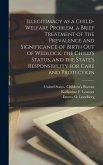Regional variations in public welfare provision have been the cause of some of the most heated debates about the public service sector. Very often, the geographical factors inherent in these anomalies are ignored. First published in 1989, The Geography of Public Welfare Provision (now with a new preface by the author) shows just how important these factors are and introduces the reader to a crucial aspect of Britain's welfare service system. Comparing the variable patterns of welfare we observe in the population with the service provision made by local authorities and other agencies, Sarah Curtis considers how far these are fair and equitable. She examines the socio-geographical characteristics of groups of people who are most vulnerable in society, and most likely to need to use services, focusing especially on three groups: the elderly, the young, and ethnic minorities. Exploring the restructuring of the welfare system of the time, the book charts how this affected the relationship between public, private, and voluntary sectors of welfare service provision. With information drawn from extensive research, The Geography of Public Welfare Provision provides a detailed account of the British welfare system relevant to students and local authority policy makers in Britain and many other countries.
Bitte wählen Sie Ihr Anliegen aus.
Rechnungen
Retourenschein anfordern
Bestellstatus
Storno








